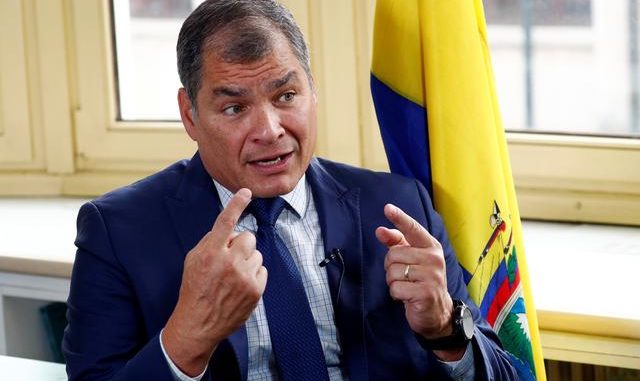
Ecuador’s former president Rafael Correa denied on Tuesday he was orchestrating a coup against the government from his self-imposed exile in Belgium, after being accused of stoking the worst unrest in years in the Andean oil producer.
Protests over an end to fuel subsidies have erupted across the country, prompting President Lenin Moreno to accuse Correa, his predecessor and one-time mentor, of trying to overthrow him with help from Venezuela’s President Nicolas Maduro.
“They are such liars … They say I am so powerful that with an iPhone from Brussels I could lead the protests,” he told Reuters, holding up his mobile telephone. “People couldn’t take it anymore, that’s the reality,” he said, referring to austerity measures brought in by Moreno with support from the IMF.
Moreno has abandoned the leftist policies of Correa’s time as president from 2007 to 2017, a rare period of stability for a country accustomed to political turmoil but which ended in corruption allegations and a rise in Ecuador’s external debt.
Thousands of indigenous protesters have marched into the capital for a sixth day after Moreno announced a measure to eliminate fuel subsidies to reduce the fiscal deficit. A national strike is planned for Wednesday.
In a defiant national television address on Monday evening, Moreno, who has left the capital Quito, said he would not back down on the fuel price hike in the face of what he called a “detribalization plan” orchestrated by Correa and Maduro.Ecuador’s former president Rafael Correa speaks during an interview with Reuters in Brussels, Belgium, October 8, 2019. REUTERS/Francois Lenoir
Correa, who lives with his wife in a small town south of Brussels, has fiercely criticized Moreno, including with a video circulating on social media where he sings “Ecuadoreans, to the streets … Goodbye, Lenin!”
He reiterated that view on Tuesday, saying that “the government has already fallen” and that he did not expect Moreno, who is in the southern port city of Guayaquil, to be able to return to Quito to govern while the protests continue.
“Why don’t they announce early elections,” he said, calling on Ecuadoreans to exercise the right to resist what he called government oppression.
Sitting in an empty office with an Ecuadorean flag and his official photograph as president, Correa said he would be ready to return, possibly as a candidate for vice president, if new elections were called.
“If it’s necessary, I will go back. I would have to be a candidate for something, for example, vice president,” said Correa, who said he earns a living in Brussels partly consulting for the Venezuela government and interviews for Russia’s RT channel, which is backed by the Russian state.
“From there, we would need a constituent assembly,” he said, although he declined to give details about any future government policies. “This isn’t my plan, I am obliged to do this.”
MULTIPLE CORRUPTION CHARGES
He denied any direct links to Venezuela’s Maduro, who France, the United States and several Latin American nations accuse of installing a dictatorship as a political and economic crisis deepens in Venezuela.Slideshow (2 Images)
But he also accused the United States and the European Union of hypocrisy for imposing economic sanctions on the Maduro government, which stands accused of rights abuses.
“They have a criminal blockade (against Venezuela). They must lift it.”
Correa, who said he was working on five different books, defended his decision to live in his wife’s native Belgium after leaving office in 2017. He said that it was right that after 26 years living as a couple in Ecuador, they spend time in Belgium.
But he also acknowledged he faced 29 different charges against him, from corruption to misuse of power, in Ecuador, and that he would not go back unless the political situation changed because he said he would not be given a fair hearing.
“I have to prepare my legal case. They have asked Interpol to raise a red alert and capture me, I had to hire a lawyer … it is an enormous task. In the last few years, I’ve worked just to pay lawyers.”
Reporting by Robin Emmott; Editing by Angus MacSwanOur Standards:The Thomson Reuters Trust Principles.
BRUSSELS (Reuters) –
